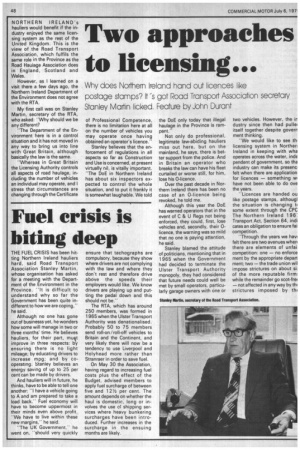Fuel crisis is biting deep
Page 50

If you've noticed an error in this article please click here to report it so we can fix it.
THE FUEL CRISIS has been hitting Northern Ireland hauliers hard, said Road Transport Association Stanley Martin, whose organisation has asked for a meeting with the Department of the Environment in the Province. "It is difficult to understand why so far the Government has been quite indifferent to how we are coping," he said.
Although no one has gone out of businesss yet, he wonders how some will manage in two or three months' time. He believes hauliers, for their part, mukt improve in three respects: by ensuring there is no light mileage; by educating drivers to increase mpg; and by cooperating. Stanley believes an energy saving of up to 25 per cent can be made by drivers.
And hauliers will in future, he thinks, have to be able to tell one another: "I have a vehicle going to A and am prepared to take a load back." Fuel economy will have to become uppermost in their minds even above profit. We have to live within these new margins," he said.
"The UK Government," he went on "should very quickly ensure that tachographs are compulsory, because they show where drivers are not complying with the law and where they don't rest and therefore drive above the speeds their employers would like. We know drivers are playing up and putting the pedal down and this should not be."
The RTA, which has around 250 members, was formed in 1965 when the Ulster Transport Authority was denationalised. Probably 50 to 75 members send roll-on /roll-off vehicles to Britain and the Continent, and very likely there will now be a tendency to use Liverpool and Holyhead more rather than Stranraer in order to save fuel.
On May 30 the Association, having regard to increasing fuel costs plus the effect of the Budget, advised members to apply fuel surcharge of between five and 121/2 per cent. The amount depends on whether the haul is domestic, long or involves the use of shipping services where heavy bunkering surcharges have been introduced. Further increases in the surcharge in the ensuing months are likely.




























































































































